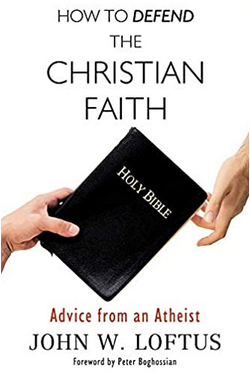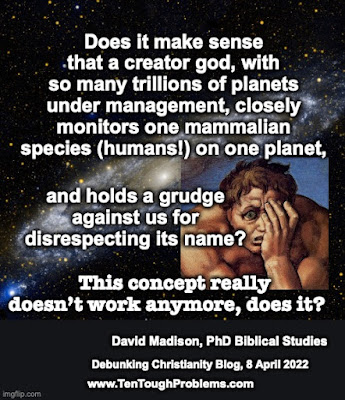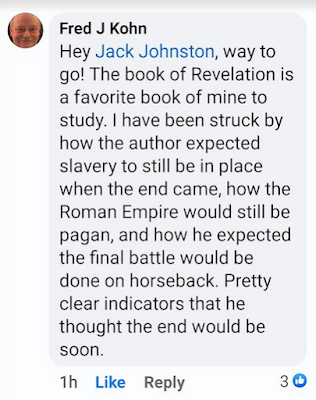This essay began as an
opening statement in a debate with Scott Tomlinson, who is on the board of Reasonable
Faith, an organization whose founder and owner is the premier apologist of
our era, William Lane Craig. The debate took place on March 13, 2023, at the
Reston Bible Church, in Dulles, Virginia. Let it be said I didn’t do all that
well. But I did good enough. Since Craig has refused to debate me as a
former student of his, I consider debating Scott a second best choice.
What follows is an extended and updated essay based on my
opening statement, which I’m publishing after some further thought. [You can
see the original PowerPoint (with a few errors) at https://www.debunking-christianity.com/2023/03/my-debate-power-point.html]
The thing I like most about debates is they force me
to put into words my strongest arguments on a given subject at a given time.
See what you think, especially since I wrote the 2016 book, Unapologetic:
Why Philosophy Must End, severely downplaying the role of philosophy of
religion as it’s practiced. This is better than fruitlessly debating the five
ways of Aquinas.
I'm done writing and editing books, so I'm highlighting each one of them in thirteen separate posts.
The first thing you should know is that the publisher wanted to name this
book, Deliver Us From Evil. Since my goal was to produce books named
after the
Four Horsemen
(plus Victor Stenger, who just missed that party with his 2007 NY Times
Bestseller, God: The Failed Hypothesis), I was adamantly opposed to it. So was Richard Carrier, and I think
Russell Blackford, who all voiced our objections.
On hindsight, after
I failed to edit a book named after Daniel Dennett's book, like Breaking the Christian Spell,
I wish we had used that provocative title instead. It sounds sexy doesn't it? Deliver Us From Evil. I like it now, especially after the rise to
power of Christian Theocratic/Nationalists with the twice impeached one-term former
President Donald Trump, and the January 6th failed coup attempt on American
democracy after failing to steal a presidential election.
The
evidential problem of horrendous suffering is one of the most powerful refutations of the
theistic god as can be found: If there’s a theistic omni-everything god, who is
omnibenelovent (or perfectly good), omniscient (or all-knowing), and omnipotent (or all-powerful), the issue
of why there is horrendous suffering in the world requires an explanation. The
reason is that a perfectly good god would want to eliminate it, an all-knowing god
would know how to eliminate it, and an all-powerful god would be able to eliminate
it. So the extent of horrendous suffering means that either god does not care
enough to eliminate it, or god is not smart enough to to eliminate it,
or god is not powerful enough to eliminate it. The stubborn fact of horrendous
suffering means something is wrong with god’s goodness, his knowledge, or his
ability.

My heart just broke at the news that Dr. Hector Avalos just died. He was a Harvard trained biblical scholar, my friend, and team member here at DC. He died after a battle with cancer. Here is his obituary He'll be missed greatly! I wept at the news. My heartfelt sympathies go out to his wife Cynthia and other loved ones and friends. I loved this man. I loved his scholarship. I loved him for his support of my work. I loved his demeanor and resolve. He was the greatest scholar I've ever personally met and known. He should go down in history as the greatest biblical scholar in our generation. You may disagree but that's my assessment. He made a huge difference. He will be greatly missed.
This pic of us together was taken in 2011 in South Bend, Indiana, when Hector was in my area giving a series of talks on religious violence. It was during a very short period of time when I had shaved off my goatee. His wife Cynthia took it.
I dedicate this book to Hector Avalos who is expertly leading a second wave of atheist biblical scholars following the first wave of new atheists. His writings are multidisciplinary in scope (covering biblical, scientific, ethical and political issues) utilizing a variety of venues (scholarly books, journals, blog posts and newspapers), and cross-cultural in scope (in both English and Spanish). He is a one man demolition machine when it comes to debunking Christianity and its influence in today’s world.
I first gained Hector's attention when I highly recommended his book The End of Biblical Studies. Then he joined the team of writers here at DC. Here are a few of his early posts. He was relentless in countering ignorance when he was maligned. He responded with scholarship, firmness and as a gentleman. I liked how he would almost always ask his opponent a few hard questions to answer at the end. We had a mutual admiration for each other. He came to my defense several times when I was under attack, for which I was thankful. Imagine having a biblical scholar defending you as a verbal pit bull!
To see how he supported my work, below is the Foreword Hector wrote for my book Christianity is Not Great: Why Faith Fails. I share it to let readers know what he thinks is important. He thinks my work is important. If you value his opinion perhaps you should too.















